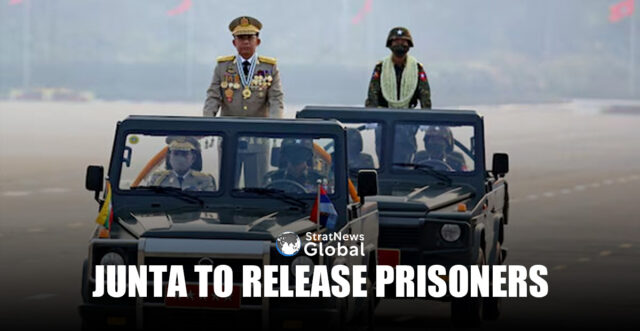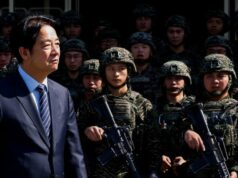Myanmar’s military government junta announced the release of 5,864 prisoners, including 180 foreigners, as part of an amnesty commemorating the country’s independence day, according to state media on Saturday.
Myanmar has been in turmoil since early 2021, when the military overthrew an elected civilian government and violently suppressed pro-democracy protests, sparking a nationwide armed rebellion.
The junta has said it will hold elections this year, but the plan has been widely condemned by opposition groups as a sham.
Among those still imprisoned by the junta is the country’s former leader, Nobel laureate Aung San Suu Kyi.
The 79-year-old is serving a 27-year sentence tied to 14 criminal charges ranging from incitement and election fraud to corruption. She denies all the charges, according to her lawyers.
According to the Assistance Association for Political Prisoners, a rights monitoring group, there were at least 28,096 prisoners, who have been arrested on political charges since the military coup, in Myanmar.
Junta Losing Ground To Resistance Forces
Myanmar’s military junta is increasingly losing ground to resistance forces following its brutal coup in February 2021.
Initially, the junta’s swift seizure of power appeared to consolidate its control, but over the months, it has faced mounting resistance from various armed groups, political organizations, and civil society movements.
The National Unity Government (NUG), a shadow government formed by ousted elected leaders and ethnic minority groups, has gained momentum in organising a coordinated resistance against the military’s rule.
One of the most significant developments is the rise of the People’s Defense Forces (PDF), a guerrilla-style resistance force comprising civilians and former military personnel who have defected.
These forces have become increasingly effective in disrupting military supply lines, ambushing convoys, and capturing strategic outposts.
The PDF is backed by the NUG, which has sought international recognition and support to bolster its fight against the junta.
In addition to these armed resistance groups, protests and civil disobedience campaigns remain widespread.
Risk Of Violence, Isolation
The junta’s harsh crackdown on these protests, including violent repression and mass arrests, has failed to quell public dissent.
It has only strengthened the resolve of Myanmar’s population, particularly in urban centres like Yangon and Mandalay, where demonstrations continue despite risks of violence.
The military junta has also faced growing international isolation, with sanctions imposed by the West and condemnation from neighbouring countries.
Although ASEAN’s attempts at mediation have largely been ineffective, the regional pressure has placed the junta under further strain.
As Myanmar’s resistance forces continue to gain strength and the junta struggles with internal divisions and increasing international scrutiny, the path forward for Myanmar remains uncertain.
The military’s grip on power appears to be weakening, signalling a prolonged and bitter struggle for control.
(With inputs from Reuters)





